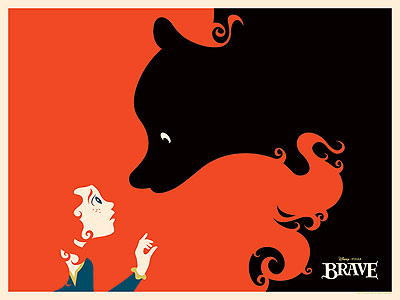Great Scot (regardless of the critics): Why I’m Into Brave
Published on July 11th, 2012 in: Critics/Criticism, Feminism, Media, Movies, Over the Gadfly's Nest, The Internets |By Maureen

Brave silkscreen print from Dark Ink
Comic-Con 2012 Exclusive
Here’s what I know: I saw Brave on its opening night and enjoyed the hell out of it. My boyfriend and I were in a theater full to the max with a good mix of children and their parents and groups of people both our age (27 and 29, respectively) and teenagers. We had a great time. Everyone was a-buzz leaving the theater, both about the film and about other Disney/Pixar endeavors.
Here’s what I don’t know: why everyone on the Internet suddenly seems to have issues with this adorable film.
When I first learned last summer that Pixar was working on a film with a female protagonist (a first for the studio), I was psyched. When I heard later it was going to be set in Scotland, my excitement grew. When I saw the first image of Merida’s orange-red curls and learned she was voiced by Kelly MacDonald, I was officially stoked. I thought the animation was gorgeous (especially the attention paid to Merida’s hair—it’s beyond time for us curly-haired ladies to be given our due diligence in the media—but that’s a rant for another article) and the story was interesting and heartwarming.
It’s on this latter point where I seem to disagree with the Internet at large. Granted, I’m not a professional critic or reviewer, but I just do not understand the backlash and negativity that this delightful summer film has been receiving. There seem to be two major arguments I’m encountering as I peruse blogs and magazines (remember those?!). One is regarding the “unoriginality: of Merida being a princess, and one is about the film’s comparative value to its predecessors.
Regarding the plot’s unoriginality, let’s get the obvious out of the way first: This is a movie primarily marketed towards children. I’m not sure what people making this criticism were expecting, but I thought the plot was child-friendly without resorting to pop-culture gags and slapstick humor (looking at you, Madagascar 3).
As far as the criticism denouncing Disney/Pixar for making Merida a princess, it assumes that it was only done so that merchandise can be marketed in the “Princess Collection.” In the setting of the story, Merida’s status makes sense. The movie takes place in ancient Scotland, a feudal kingdom where clans and highland tribes made their own societies. Where she differs from the other princesses marketed by Disney is that she rejects this route and the trappings it comes with. Merida wants to roam freely, practicing her archery skills and riding her horse through possibly enchanted forests. In my humble opinion, this makes her a different type of princess from the likes of Cinderella, Snow White, Sleeping Beauty ,and the others who are brought into a royalty lifestyle via marriage.
Sure, Merida’s a princess, but that’s not her fault. Her parents are who they are. The whole premise of the plot (including the tagline) is that she doesn’t like the hand she’s been dealt. She wants to change a fate which she feels she has no control over, one laid out for her simply because she’s a princess. I don’t see why Disney can’t market a badass feminist princess who wants to control her own life and relationships in addition to those that married Prince Charmings. There are all types of women, and that includes princesses!
Regarding the film’s comparative value, Brave is a standalone film. Not a sequel, not a prequel, not a spin-off. Pixar has produced some of the most well-loved movies in recent memory, but I feel that they all deserve to be judged on their own merits.
Maybe Brave won’t be nominated for any awards. Maybe it will. Time will tell. Maybe the critics didn’t personally enjoy it as much as a different Pixar movie or three. That’s fine. Differences of opinion are what makes the world go ‘round. But that doesn’t mean that it’s a worse movie, or a worse made movie.
Personal enjoyment is not synonymous with quality film making. Just because you personally though Wall-E was more “meaningful” or provided a social commentary you think society needed to hear doesn’t mean that the rest of us didn’t enjoy it. Maybe it wasn’t my favorite Disney film, or even my favorite Pixar film. But that doesn’t mean I didn’t have a great time watching Brave and wishing that more child-friendly films would feature curly-haired feminist protagonists.
After all, when Angelina Jolie complained that her Ethiopian daughter didn’t relate to any of the traditional Disney princesses, we got The Princess and the Frog. Everyone deserves their moment to look up at the screen and see someone they’d want to be.
2 Responses to “Great Scot (regardless of the critics): Why I’m Into Brave”
July 12th, 2012 at 3:01 pm
One point I think you forgot is that Miyazaki has had the market cornered on awesome animation with female protagonists for about thirty years. Now that Disney is their American face, maybe this will start trickling into the rest of Disney’s ethos.
July 13th, 2012 at 12:57 pm
I hope you’re right! I have never seen a Miyazaki movie and don’t really follow anime, so that’s why I didn’t include any mentions of his work in the piece.
Time limit is exhausted. Please reload the CAPTCHA.